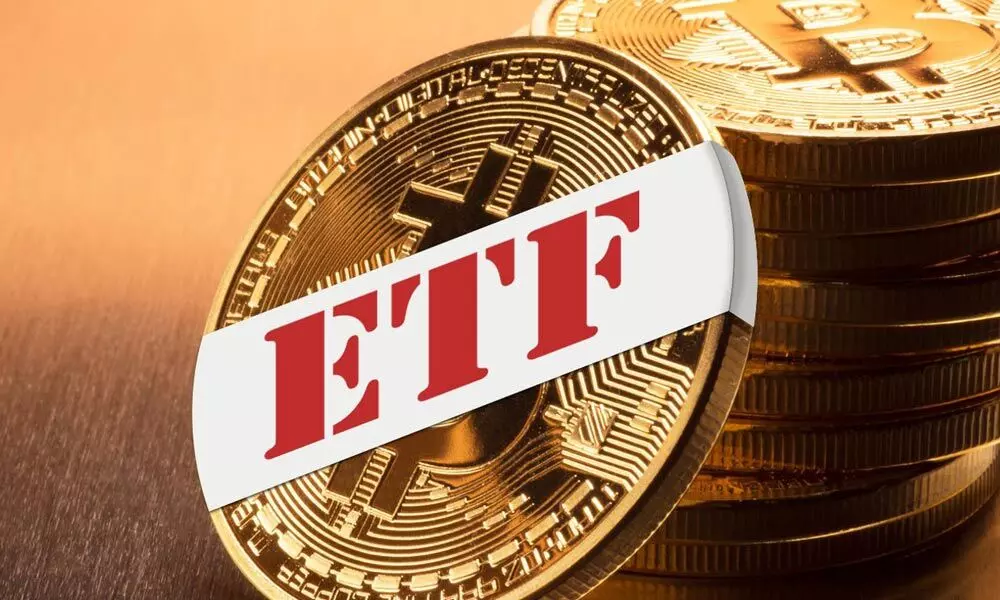Why Bitcoin ETF on Futures might not be a good idea?
After much anticipation, the ProShares Bitcoin Strategy ETF is scheduled to begin trading on Tuesday. To be clear, this isn’t an exchange-traded fund that is backed by actual Bitcoin. Instead, it is backed by futures tied to the cryptocurrency
image for illustrative purpose

After much anticipation, the ProShares Bitcoin Strategy ETF is scheduled to begin trading on Tuesday. To be clear, this isn't an exchange-traded fund (ETF) that is backed by actual Bitcoin. Instead, it is backed by Futures tied to the cryptocurrency. Before you rush headlong into this market, it's important to understand that there are crucial differences.
The vast majority of commodity-based mutual funds (MFs) and ETFs are also backed by Futures, but that's because the actual physical storage of most commodities is impractical, like with oil. Also, with almost all commodities most of the trading action and liquidity tends to happen in the futures market, not the spot market. The United States Oil Fund LP is the classic example of a commodity fund that is backed by futures. The fund earned some notoriety in 2020 when it scrambled to roll its futures contracts out the curve (in violation of its prospectus) in order to prevent the fund's bankruptcy in the event that the price of oil went negative - which it did.
The United States Oil Fund case is an example of why a Bitcoin ETF on futures might not be such a good idea; it's impossible to predict what will happen in the Futures market. But the main reason that people oppose Futures-based ETFs is the cost of carry. When commodity futures are in contango, or when the price of deferred month contracts trade above front-month contracts, there is a significant cost to roll futures contracts from one month to the next, and that underperformance is passed to the investor. This has been a major complaint about commodity ETFs for years.
While commodity futures frequently trade in contango, they can also trade in backwardation, which is when deferred month contracts trade below front month contracts. In this case, investors earn a positive roll yield. Many commodity futures are trading in backwardation at the moment, although Bitcoin is in contango. There is no reason to believe that it might not one day be in backwardation.
Gold is an example of a commodity where the ETFs hold the actual metal and not futures, because the storage and accounting of physical gold is fairly straightforward. So why can't a Bitcoin ETF hold actual Bitcoin? The reason is because the US Securities and Exchange Commission's primary objection to physical Bitcoin funds is that the underlying market is unregulated. Well, the gold market is unregulated and we have physical gold ETFs, so what gives? The Bitcoin people are trying to figure this out.
There should be a physical Bitcoin ETF. The Winkelvoss twins were the first to apply for one, back in 2013, when Bitcoin was trading below $1,000 (it's now around $62,000). If their fund had been approved, it would now likely be the largest, most liquid ETF in existence, and would have provided supercharged returns to a whole generation of investors. This is a regulatory failure. But at the time, the technology around Bitcoin was relatively primitive, there were cyber attacks happening all the time, and the sentiment back then was that Bitcoin was dangerous, unsecure and unsafe. It has matured a lot.
I invested in physical Bitcoin from 2019 to 2021 through Coinbase Global Inc. I was never comfortable with the investment. Coinbase would suffer outages, the customer service wasn't to my liking and I kept hearing stories of lost cryptocurrencies and people being locked out of their accounts. I was in a hurry to sell. If a Bitcoin ETF had existed, I would have bought that instead. It's in a brokerage account and you get formal 1099 tax documents at the end of the year to help with taxes, instead of the mishmash of a trade blotter that leaves you to figure out the taxes on your own.
I don't think it's inevitable that there will be a spot Bitcoin ETF someday, at least not until the crypto markets have a regulatory framework, which might take years. I would not hold my breath. And I don't necessarily think that Bitcoin futures ETFs are incrementally worse for investors; they will have the same issues that investors have been dealing with in the commodities markets for 15 years. It's as simple as this: the Bitcoin futures market is regulated, and the spot Bitcoin market is not. Having a spot Bitcoin ETF is analogous to having a spot live hogs ETF. The bigger business issue for ETF issuers is that there are dozens of cryptocurrency funds waiting for approval. A few of these will gain assets, such as perhaps ProShares, because they're first, but the other Bitcoin ETFs are going to end up as one big stock ticker jumble that doesn't gather much in the way of assets. Like most things in the ETF world, it's a gold rush. Being first counts, having the lowest fees counts and the marketing counts. Should be interesting to watch. (Bloomberg)

